Denise Sutherland's Blog
April 23, 2020
Hi again
 Long time no see, folks! I'm dipping my toes back into blogging and social media — pandemic isolation means I have a bit more time, and this is a good way to stay in touch.
Long time no see, folks! I'm dipping my toes back into blogging and social media — pandemic isolation means I have a bit more time, and this is a good way to stay in touch.My Facebook Page can be found here. Maybe I'll see you over there?
Published on April 23, 2020 20:52
January 4, 2015
Moving time

I have decided to move this blog over to my Sutherland Studios website, which has just been completely redesigned, and now includes a blog. I'm a bit terrified of actually migrating all the posts wholesale (complimicated code stuff), so I will just leave everything here for now, and duplicate the more popular posts from here over there.
I'm hoping that this will encourage me to stay a bit more current with my blog writing too — we can but hope! So please redirect yourselves over to Sutherland Studios — you can even sign up for blog post notifications if you're so inclined.
Published on January 04, 2015 03:31
December 23, 2014
Myrrh, Mice, Stars
Best wishes for Christmas and and the New Year! May your 2015 be filled with puzzles and conundrums (of the entertaining kind)!
Here's a great puzzle-y comic from one of my fave webcomics, Girls With Slingshots.

PS the title of this post is an anagram, did you figure it out?
Here's a great puzzle-y comic from one of my fave webcomics, Girls With Slingshots.

PS the title of this post is an anagram, did you figure it out?
Published on December 23, 2014 13:08
November 4, 2014
Crosswords online
Just in case the plethora of crossword magazines out there isn't enough for you — "More, more!" I hear you cry! — there are vast numbers of online crossword sites.
The Guardian website has a huge collection of cryptic and quick crosswords, from over 30 setters. They have an archive crossword search function, so you can easily locate puzzles by your favourite setter, type, or publication date. You can also sign up for the crossword editor’s monthly update email, and participate in discussions about each crossword in comments below each crossword. You can either solve them online, or download print versions to do with pencil on paper.

The Puzzle Wizard series of magazines is produced by the excellent independent Australian puzzle writer and publisher, Greg Parker. His website includes a bunch of puzzles to solve online. There are six crossword themes you can choose from Straight Crosswords, Movies, AFL, Cricket, Music, and Television. There are also 100 free crosswords. They require a Java plug-in to work, which can be downloaded here, if you don't have it already.
If you really want to test your mettle, then The Times is the place to go. This is a subscription service, via their Crossword Club, and includes the famous (infamous?) Times Cryptic, as well as quick crosswords, codewords, sudoku, and bridge and chess problems.
The Mirror Online is a UK site, with a whole lot of free crosswords. The cryptic is of an easy level, and there are also quick and quiz crosswords to try.
Puzzlers’ Cave has free quick, cryptic and themed crosswords, which are British-style. The site also has free Sudoku puzzles. Puzzles are submitted by Puzzlers’ Cave members (ie amateur setters). Membership is free. You can also use the site’s Crossword Compilation software to create your own crosswords — the basic software is free to download, while the professional edition costs about £25 (Windows only).
If you like rude cryptics (and who doesn't?), then The Private Eye cryptic crossword is for you! This is a very UK-centric cryptic, with plenty of politicians' names etc, you have been warned. My goodness it's rude. This is the link everyone's going to click on, isn't it.
 The Clue Detective Puzzle Agency
is an Australian subscription site, with an annual membership fee. There is a huge collection of online puzzles, which can also be printed, or solved on iPads etc. They include trivia quizzes, codewords, regular crosswords, general knowledge crosswords, crosswords for kids, and cryptics (my Nixie ones, only place you can find 'em).
The Clue Detective Puzzle Agency
is an Australian subscription site, with an annual membership fee. There is a huge collection of online puzzles, which can also be printed, or solved on iPads etc. They include trivia quizzes, codewords, regular crosswords, general knowledge crosswords, crosswords for kids, and cryptics (my Nixie ones, only place you can find 'em).
And if that's not enough for you — "More, more!" I hear you cry! — Crossword Puzzles has a good (although not exhaustive) collection of links to even more crossword sites and resources.
Now, you can never complain about not having enough puzzles to solve! So there.
The Guardian website has a huge collection of cryptic and quick crosswords, from over 30 setters. They have an archive crossword search function, so you can easily locate puzzles by your favourite setter, type, or publication date. You can also sign up for the crossword editor’s monthly update email, and participate in discussions about each crossword in comments below each crossword. You can either solve them online, or download print versions to do with pencil on paper.

The Puzzle Wizard series of magazines is produced by the excellent independent Australian puzzle writer and publisher, Greg Parker. His website includes a bunch of puzzles to solve online. There are six crossword themes you can choose from Straight Crosswords, Movies, AFL, Cricket, Music, and Television. There are also 100 free crosswords. They require a Java plug-in to work, which can be downloaded here, if you don't have it already.
If you really want to test your mettle, then The Times is the place to go. This is a subscription service, via their Crossword Club, and includes the famous (infamous?) Times Cryptic, as well as quick crosswords, codewords, sudoku, and bridge and chess problems.
The Mirror Online is a UK site, with a whole lot of free crosswords. The cryptic is of an easy level, and there are also quick and quiz crosswords to try.
Puzzlers’ Cave has free quick, cryptic and themed crosswords, which are British-style. The site also has free Sudoku puzzles. Puzzles are submitted by Puzzlers’ Cave members (ie amateur setters). Membership is free. You can also use the site’s Crossword Compilation software to create your own crosswords — the basic software is free to download, while the professional edition costs about £25 (Windows only).
If you like rude cryptics (and who doesn't?), then The Private Eye cryptic crossword is for you! This is a very UK-centric cryptic, with plenty of politicians' names etc, you have been warned. My goodness it's rude. This is the link everyone's going to click on, isn't it.
 The Clue Detective Puzzle Agency
is an Australian subscription site, with an annual membership fee. There is a huge collection of online puzzles, which can also be printed, or solved on iPads etc. They include trivia quizzes, codewords, regular crosswords, general knowledge crosswords, crosswords for kids, and cryptics (my Nixie ones, only place you can find 'em).
The Clue Detective Puzzle Agency
is an Australian subscription site, with an annual membership fee. There is a huge collection of online puzzles, which can also be printed, or solved on iPads etc. They include trivia quizzes, codewords, regular crosswords, general knowledge crosswords, crosswords for kids, and cryptics (my Nixie ones, only place you can find 'em).And if that's not enough for you — "More, more!" I hear you cry! — Crossword Puzzles has a good (although not exhaustive) collection of links to even more crossword sites and resources.
Now, you can never complain about not having enough puzzles to solve! So there.
Published on November 04, 2014 14:44
October 1, 2014
Silly definitions A-M
I don't quite know where the last seven weeks disappeared to, seem to have lost my blogging mojo for a bit there.
Anyway ... I thought it would be fun to share with you some of the very silly definitions from my friend Troy Simpson's book, The Funny Dictionary . These definitions have come from student essays, which Troy heroically trawled through. I did these few illustrations for the book.
A la carte: When you can have all the desserts that's on the trolley
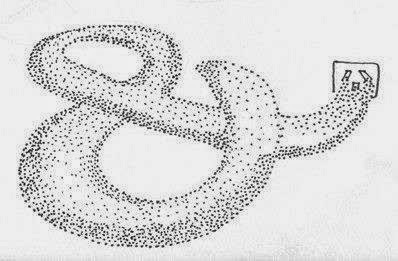 Ampersand: A special kind of sand used in electricityAve Domine: 'Lord, I am a bird.' [my favourite]
Ampersand: A special kind of sand used in electricityAve Domine: 'Lord, I am a bird.' [my favourite]
Barber: The opposite of heiress
Botulism: A close study of plants
Caterer: Someone who minds your cat
Circular Argument: Presiding at a board meeting
Coup de Grâce: A lawn mower
Cynic: Someone who refuses to believe in fairy tales
Decimal: A fraction with a point
Democracy: Government by demons
Diabolic: Having diabetes
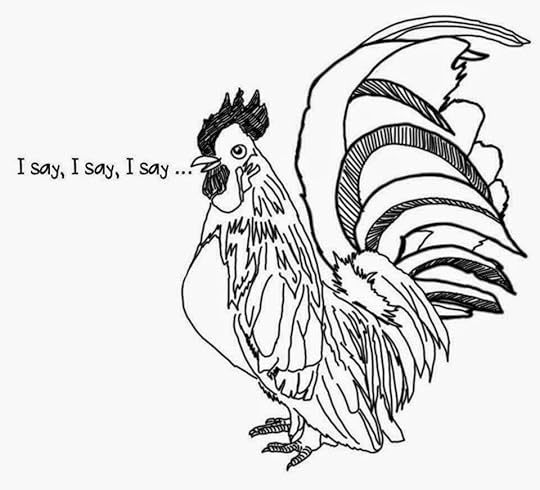 Banter: a small roosterDogma: The mother of puppies
Banter: a small roosterDogma: The mother of puppies
Dolt: Grown-up person
Emu: The name of the noise made by a cat
Equestrian: One who asks questions
Etymologist: A man who catches butterflies and stuffs them
Fetish: People who enjoy going to fetes
Fiction: Those books that are fixed on the shelves and are not to be moved; non-fiction are not fixed and may be moved at will
Filet Mignon: An opera by Puccini
Giraffe: The highest form of life
Grammar: An important part of languish
Grizzly: A bear that grizzles all day
H2O: H I J K L M N O (this is actually the basis of a famous cryptic clue, too!)
Hooligan: A polygon with seven sides
 Argonaut: A man who goes up in a spaceshipHimalayas: Very lofty and steep mountains, and about five times the length of Earlsfield Road
Argonaut: A man who goes up in a spaceshipHimalayas: Very lofty and steep mountains, and about five times the length of Earlsfield Road
Ignorant: Not knowing what to say when your teacher asks you something silly
Import: A port very far inland
Indigo: Like vertigo, only deep blue
Jigsaws: What people in Japan ride in
Ladies: The plural possessive of gentlemen
Lent: A dull time that we deliberately make even duller
Lunatic: From luna meaning moon, and attic, meaning top story
Macaroons: A type of sprgety [sic!]
Mangoes: Wherever woman goes
Microbe: A robe that mics wear
Milky Way: The way you feed infants
Misery: Someone who travels to remote places to convert savages into Christians
Monotony: Having only one wife or husband
Mother-in-law: Part of marriage that cannot be escaped, like the bride
Multitude: What you get when you multiply
....
I'll post Part 2 soon!
Anyway ... I thought it would be fun to share with you some of the very silly definitions from my friend Troy Simpson's book, The Funny Dictionary . These definitions have come from student essays, which Troy heroically trawled through. I did these few illustrations for the book.
A la carte: When you can have all the desserts that's on the trolley
 Ampersand: A special kind of sand used in electricityAve Domine: 'Lord, I am a bird.' [my favourite]
Ampersand: A special kind of sand used in electricityAve Domine: 'Lord, I am a bird.' [my favourite]Barber: The opposite of heiress
Botulism: A close study of plants
Caterer: Someone who minds your cat
Circular Argument: Presiding at a board meeting
Coup de Grâce: A lawn mower
Cynic: Someone who refuses to believe in fairy tales
Decimal: A fraction with a point
Democracy: Government by demons
Diabolic: Having diabetes
 Banter: a small roosterDogma: The mother of puppies
Banter: a small roosterDogma: The mother of puppiesDolt: Grown-up person
Emu: The name of the noise made by a cat
Equestrian: One who asks questions
Etymologist: A man who catches butterflies and stuffs them
Fetish: People who enjoy going to fetes
Fiction: Those books that are fixed on the shelves and are not to be moved; non-fiction are not fixed and may be moved at will
Filet Mignon: An opera by Puccini
Giraffe: The highest form of life
Grammar: An important part of languish
Grizzly: A bear that grizzles all day
H2O: H I J K L M N O (this is actually the basis of a famous cryptic clue, too!)
Hooligan: A polygon with seven sides
 Argonaut: A man who goes up in a spaceshipHimalayas: Very lofty and steep mountains, and about five times the length of Earlsfield Road
Argonaut: A man who goes up in a spaceshipHimalayas: Very lofty and steep mountains, and about five times the length of Earlsfield RoadIgnorant: Not knowing what to say when your teacher asks you something silly
Import: A port very far inland
Indigo: Like vertigo, only deep blue
Jigsaws: What people in Japan ride in
Ladies: The plural possessive of gentlemen
Lent: A dull time that we deliberately make even duller
Lunatic: From luna meaning moon, and attic, meaning top story
Macaroons: A type of sprgety [sic!]
Mangoes: Wherever woman goes
Microbe: A robe that mics wear
Milky Way: The way you feed infants
Misery: Someone who travels to remote places to convert savages into Christians
Monotony: Having only one wife or husband
Mother-in-law: Part of marriage that cannot be escaped, like the bride
Multitude: What you get when you multiply
....
I'll post Part 2 soon!
Published on October 01, 2014 19:16
August 14, 2014
The Care and Feeding of Indexers
We indexers are a hardy species. We are almost all self-employed, which means we're good at working alone, and are self-motivated and organised. We work long hours when an indexing job comes in, including nights and weekends, to meet publishers' and authors' deadlines.
But despite this hardiness, we do need some care. We are still human. We can't work miracles. The following lists addresses frequent grievances, and ways you can look after your indexers better.
1. We need you now!
Don't contact us for a quote, and then expect us to be available that week. Many of us have work booked in advance, for months. We need advance notice.
 An exasperated indexer (me). We're pretty low key2. It's going to be late ...
An exasperated indexer (me). We're pretty low key2. It's going to be late ...
When you give us a deadline for the delivery of a manuscript, we book it in to our work calendars. We often have many projects coming in, one after the other, and we schedule them accordingly.
When you run late with delivery, it puts our whole work schedule out, and it affects other indexes, and other things we are committed to, not to mention our stress levels.
We understand that schedules slip on book projects — we see it all the time, and many of us build a bit of 'slip time' into our schedules. So if your manuscript is running late, pleeeease let us know right away, so we can juggle our other projects (where possible). Don't tell us on the day we're expecting the manuscript to arrive.
3. ... and we still need the index by the original deadline
Delivering a manuscript late, but expecting us to deliver by the original deadline, cutting days or weeks off our schedule, is also unrealistic and unreasonable.
When we say an index will take us X number of days, we mean X days of full on intensive work. As an example, when I have an index coming in, I stock up the freezer with meals the week before, because I know I won't have the time or energy to shop or cook while I'm indexing. I eat at my desk. My family fends for itself (a frightening sight).
We can't suddenly compress that time, and produce a professional index in less time. Indexing is very mentally taxing, and we can't do a good job if we have to index 14 hours straight, for days at a time. Brains start leaking out of ears, which makes a horrible mess, just for starters.
If your manuscript is late, ask us if we need extra time to complete the index, and work to squeeze in some flexibility into your publishing schedule — for instance, a submission time of 9 am Monday is not functionally different from 5 pm Friday in terms of office hours, but gives us many more work hours.
4. Hello? Hello? Is this thing on?
During the indexing process, we will undoubtably have questions for you. On things like name variations, how you want certain topics handled, whether something in the manuscript is a typo or not, and so on. Because we have to work fast, to meet your deadline, we also need to hear back from you quickly too. If we have to chase emails, and resend questions, and bug you to get responses, it's just annoying for both parties, and wastes time.
And when we submit the final index to you for editing, and then the final files, please acknowledge receipt of the files. We don't like to assume that email is working, and that the files got through.
4. You want what?
Ah, the brief. What you expect, and how much you're prepared to pay for it. These are often unrealistic.
5. How many pages?
There's only so much index we can squeeze onto a page, with tiny text and double columns. Not having a reasonable number of pages set aside for the index is a constant issue for us. 'Culling' is a frequent task when editing an index.
An index in a 'general audience' book needs to be around 4% of the book length. An academic book requires up to 10–15% of the book.
So a general audience book that is 300 pages long needs at least 12 pp set aside for the index. An academic book of the same length needs more like 30–45 pages for the index. The more in-depth or "detailed" you want the index to be, the more pages it needs, and more time it takes to write.
Expecting us to write a detailed index for a 300 page book in only 4 pages is not only a disservice to the book, author, and readers, but a huge headache for us. We will have to leave out all sorts of information in the index, out of necessity.
In the planning stages of the book, please please PLEASE (bold caps — doesn't get more pleady than that) reserve a decent number of pages for the index. As a rough guide, you need 4% for a general book (4 pages of index for 100 pages of text), and around 10% for an academic title (10 pages of index for 100 pages of text).
7. Ch-ch-ch-changes
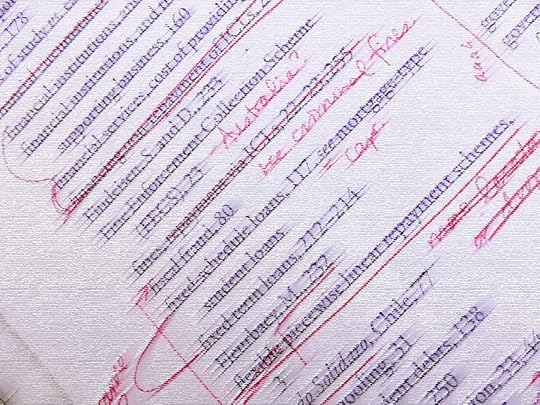 Changes to the manuscript while we're indexing it are a nightmare, especially significant text changes. Adding several paragraphs, or deleting a figure, can cause shifts to where page breaks fall, and fixing this entails tedious editing of hundreds of index entries. (Whole page additions or deletions aren't so bad, as our software can make shifts to page ranges easily.)
Changes to the manuscript while we're indexing it are a nightmare, especially significant text changes. Adding several paragraphs, or deleting a figure, can cause shifts to where page breaks fall, and fixing this entails tedious editing of hundreds of index entries. (Whole page additions or deletions aren't so bad, as our software can make shifts to page ranges easily.)
So we really do ideally want to work from set-in-stone final manuscripts. Otherwise we might be forced to kill you charge you for extra work.
When we submit the final draft index to you for comments, that is not the time we want to hear things like "Oh, we want to treat all names like this ... with no first names, just initials." That's something we'd really rather be hearing at the start of indexing. We needn't have typed in all those names, and double checked their spelling. Editing them all out at the end is a waste of time, not to mention annoying.
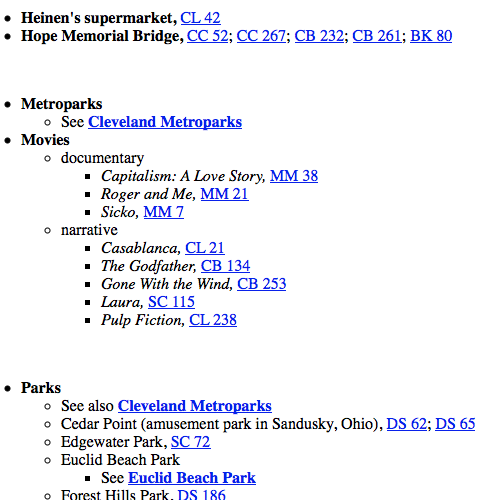 Code for an ebook index, from ASI DTTFPlease let us know your standard forms for names of people and institutions, and anything else of import, and the way you want things done, when we get the manuscript. There are many different standards in indexing, and lots of ways of approaching things. Don't assume we know what you're thinking.
Code for an ebook index, from ASI DTTFPlease let us know your standard forms for names of people and institutions, and anything else of import, and the way you want things done, when we get the manuscript. There are many different standards in indexing, and lots of ways of approaching things. Don't assume we know what you're thinking.
6. Thou shalt follow the word list!
Please don't give us lists of 'words to include in the index' (unless we specifically ask for them). For some indexers, this gets you black listed quick smart. We are professionals. We know what we're doing. And we know how to pick up topics and terms in a text.
8. Ebook indexes, don't they just get generated automatically?
No. Interactive ebook indexes are created quite differently from paper-based indexes. There is different software involved, just for starters, not to mention a different indexing process. So if you are single-sourcing to print and ebook, please talk to your indexer at the start of layout! We're all over that shit.
So, if you deliver your manuscript on time, give us enough pages for the index, and enough time to write it without being in a panic, are clear in your expectations and communication, are prompt with feedback, and trust us to do a professional job, we will love you forever! And if you give us a credit on the imprint page, and send us a copy of the book once it's published, we'll even wash your dishes.
But despite this hardiness, we do need some care. We are still human. We can't work miracles. The following lists addresses frequent grievances, and ways you can look after your indexers better.
1. We need you now!
Don't contact us for a quote, and then expect us to be available that week. Many of us have work booked in advance, for months. We need advance notice.
 An exasperated indexer (me). We're pretty low key2. It's going to be late ...
An exasperated indexer (me). We're pretty low key2. It's going to be late ...When you give us a deadline for the delivery of a manuscript, we book it in to our work calendars. We often have many projects coming in, one after the other, and we schedule them accordingly.
When you run late with delivery, it puts our whole work schedule out, and it affects other indexes, and other things we are committed to, not to mention our stress levels.
We understand that schedules slip on book projects — we see it all the time, and many of us build a bit of 'slip time' into our schedules. So if your manuscript is running late, pleeeease let us know right away, so we can juggle our other projects (where possible). Don't tell us on the day we're expecting the manuscript to arrive.
3. ... and we still need the index by the original deadline
Delivering a manuscript late, but expecting us to deliver by the original deadline, cutting days or weeks off our schedule, is also unrealistic and unreasonable.
When we say an index will take us X number of days, we mean X days of full on intensive work. As an example, when I have an index coming in, I stock up the freezer with meals the week before, because I know I won't have the time or energy to shop or cook while I'm indexing. I eat at my desk. My family fends for itself (a frightening sight).
We can't suddenly compress that time, and produce a professional index in less time. Indexing is very mentally taxing, and we can't do a good job if we have to index 14 hours straight, for days at a time. Brains start leaking out of ears, which makes a horrible mess, just for starters.
If your manuscript is late, ask us if we need extra time to complete the index, and work to squeeze in some flexibility into your publishing schedule — for instance, a submission time of 9 am Monday is not functionally different from 5 pm Friday in terms of office hours, but gives us many more work hours.
4. Hello? Hello? Is this thing on?
During the indexing process, we will undoubtably have questions for you. On things like name variations, how you want certain topics handled, whether something in the manuscript is a typo or not, and so on. Because we have to work fast, to meet your deadline, we also need to hear back from you quickly too. If we have to chase emails, and resend questions, and bug you to get responses, it's just annoying for both parties, and wastes time.
And when we submit the final index to you for editing, and then the final files, please acknowledge receipt of the files. We don't like to assume that email is working, and that the files got through.
4. You want what?
Ah, the brief. What you expect, and how much you're prepared to pay for it. These are often unrealistic.
Money
Expecting a long detailed index for practically no money is just not going to happen. An index can take anywhere from 20 to 50 hours to write. Not joking. Sure, some books may be simpler, and their indexes can be produced quickly. But in general you're looking at at least a few thousand dollars for a professional index.
We are always happy to adjust what we produce to your budget — a simpler, less detailed index can be written more quickly, for instance. And some indexers will give discounts to self-publishers (something I do, for instance), or to non-profit organisations and so on. Be up front about what you can afford, and we'll work out how best to provide an index within your budget. But we are professionals, doing a very skilled task, and this attracts a professional rate of payment.
Time
This comes under points 1 and 2 above ... but no, we can't produce a good index for a 350 page book in 3 days. Would you like some Unicorn Pie with that?
5. How many pages?
There's only so much index we can squeeze onto a page, with tiny text and double columns. Not having a reasonable number of pages set aside for the index is a constant issue for us. 'Culling' is a frequent task when editing an index.
An index in a 'general audience' book needs to be around 4% of the book length. An academic book requires up to 10–15% of the book.
So a general audience book that is 300 pages long needs at least 12 pp set aside for the index. An academic book of the same length needs more like 30–45 pages for the index. The more in-depth or "detailed" you want the index to be, the more pages it needs, and more time it takes to write.
Expecting us to write a detailed index for a 300 page book in only 4 pages is not only a disservice to the book, author, and readers, but a huge headache for us. We will have to leave out all sorts of information in the index, out of necessity.
In the planning stages of the book, please please PLEASE (bold caps — doesn't get more pleady than that) reserve a decent number of pages for the index. As a rough guide, you need 4% for a general book (4 pages of index for 100 pages of text), and around 10% for an academic title (10 pages of index for 100 pages of text).
7. Ch-ch-ch-changes
 Changes to the manuscript while we're indexing it are a nightmare, especially significant text changes. Adding several paragraphs, or deleting a figure, can cause shifts to where page breaks fall, and fixing this entails tedious editing of hundreds of index entries. (Whole page additions or deletions aren't so bad, as our software can make shifts to page ranges easily.)
Changes to the manuscript while we're indexing it are a nightmare, especially significant text changes. Adding several paragraphs, or deleting a figure, can cause shifts to where page breaks fall, and fixing this entails tedious editing of hundreds of index entries. (Whole page additions or deletions aren't so bad, as our software can make shifts to page ranges easily.)So we really do ideally want to work from set-in-stone final manuscripts. Otherwise we might be forced to kill you charge you for extra work.
When we submit the final draft index to you for comments, that is not the time we want to hear things like "Oh, we want to treat all names like this ... with no first names, just initials." That's something we'd really rather be hearing at the start of indexing. We needn't have typed in all those names, and double checked their spelling. Editing them all out at the end is a waste of time, not to mention annoying.
 Code for an ebook index, from ASI DTTFPlease let us know your standard forms for names of people and institutions, and anything else of import, and the way you want things done, when we get the manuscript. There are many different standards in indexing, and lots of ways of approaching things. Don't assume we know what you're thinking.
Code for an ebook index, from ASI DTTFPlease let us know your standard forms for names of people and institutions, and anything else of import, and the way you want things done, when we get the manuscript. There are many different standards in indexing, and lots of ways of approaching things. Don't assume we know what you're thinking.6. Thou shalt follow the word list!
Please don't give us lists of 'words to include in the index' (unless we specifically ask for them). For some indexers, this gets you black listed quick smart. We are professionals. We know what we're doing. And we know how to pick up topics and terms in a text.
8. Ebook indexes, don't they just get generated automatically?
No. Interactive ebook indexes are created quite differently from paper-based indexes. There is different software involved, just for starters, not to mention a different indexing process. So if you are single-sourcing to print and ebook, please talk to your indexer at the start of layout! We're all over that shit.
So, if you deliver your manuscript on time, give us enough pages for the index, and enough time to write it without being in a panic, are clear in your expectations and communication, are prompt with feedback, and trust us to do a professional job, we will love you forever! And if you give us a credit on the imprint page, and send us a copy of the book once it's published, we'll even wash your dishes.
Published on August 14, 2014 23:20
August 3, 2014
Born Bad ��� a wicked index
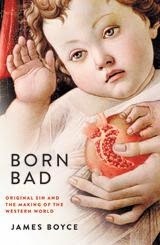 The latest book I've indexed is Born Bad, by James Boyce (Black Inc. Publishing). This is a fascinating book, tracing the history and impact of the idea of original sin, from its origin from St Augustine in the late 4th century, to the modern day. I highly recommend it!
The latest book I've indexed is Born Bad, by James Boyce (Black Inc. Publishing). This is a fascinating book, tracing the history and impact of the idea of original sin, from its origin from St Augustine in the late 4th century, to the modern day. I highly recommend it!There were several points to make decisions about in this index (well, every index is a constant process of decision making, to be honest).
Firstly were a bunch of medieval names, how are these treated? And the names of saints and popes?
With names such as Friedrich the Wise, I used direct order for the entry (ie written as is, 'Friedrich the Wise'), not inverted (Wise, Friedrich the), as 'Wise' isn't a surname. The same goes for names such as Julian of Norwich ... 'Norwich' isn't a surname, so he appears in the index under J for Julian.
With popes and saints, the way I treated these names (as there were a lot of them mentioned) was under their 'holy' names, with a gloss after the name. For example, Pope John XXII becomes John XXII (pope), in the index. And St. Francis of Assisi is indexed as Francis of Assisi (saint).
There is a lot of discussion in the book about the spiritual nature of babies, whether they are born sinful, or good. My favourite index entry, which highlights the absurdity of assuming that babies are evil, is vipers: less hateful than babies, 123 (I always try to include at least one or two cheeky entries in my indexes, if I can get away with it!)
(This points to a quote from Jonathan Edwards, the influential American Congregationalist cleric)
With entries from evil, sex and sexual desire, 'eaves children', and runaway nuns, to social media, guilt, free market and de Botton, Alain, I think many people will enjoy reading this book, and learning how the idea that we were 'born bad' has influenced the development of Western civilisation over the millennia. It makes me wonder what society would be like today if Western Christianity had decided, way back in the 5th century, that we were all born good?
Published on August 03, 2014 16:29
Born Bad — a wicked index
 The latest book I've indexed is Born Bad, by James Boyce (Black Inc. Publishing). This is a fascinating book, tracing the history and impact of the idea of original sin, from its origin from St Augustine in the late 4th century, to the modern day. I highly recommend it!
The latest book I've indexed is Born Bad, by James Boyce (Black Inc. Publishing). This is a fascinating book, tracing the history and impact of the idea of original sin, from its origin from St Augustine in the late 4th century, to the modern day. I highly recommend it!There were several points to make decisions about in this index (well, every index is a constant process of decision making, to be honest).
Firstly were a bunch of medieval names, how are these treated? And the names of saints and popes?
With names such as Friedrich the Wise, I used direct order for the entry (ie written as is, 'Friedrich the Wise'), not inverted (Wise, Friedrich the), as 'Wise' isn't a surname. The same goes for names such as Julian of Norwich ... 'Norwich' isn't a surname, so he appears in the index under J for Julian.
With popes and saints, the way I treated these names (as there were a lot of them mentioned) was under their given names, with a gloss after the name. For example, Pope John XXII becomes John XXII (pope), in the index. And St. Francis of Assisi is indexed as Francis of Assisi (saint).
There is a lot of discussion in the book about the spiritual nature of babies, whether they are born sinful, or good. My favourite index entry, which highlights the absurdity of assuming that babies are evil, is vipers: less hateful than babies, 123 (I always try to include at least one or two cheeky entries in my indexes, if I can get away with it!)
(This points to a quote from Jonathan Edwards, the influential American Congregationalist cleric)
With entries from evil, sex and sexual desire, 'eaves children', and runaway nuns, to social media, guilt, free market and de Botton, Alain, I think many people will enjoy reading this book, and learning how the idea that we were 'born bad' has influenced the development of Western civilisation over the millennia. It makes me wonder what society would be like today if Western Christianity had decided, way back in the 5th century, that we were all born good?
Published on August 03, 2014 16:29
July 22, 2014
Gemini 7043
Time for another Gemini analysis. This is for the Gemini cryptic #7043, which was published in The Canberra Times on 15 July 2014.
A usual, the definition part of the clue is underlined, except for double definition and cryptic definition clues.
ACROSS Photo By Great British Chefs Team via http://imagefinder.co/
Photo By Great British Chefs Team via http://imagefinder.co/
1. Eggs it's nice to scramble (7) = INCITES
The definition is a nice confusion here — it's a verb, as in egging on someone, not a noun! Anagram indicated by scramble of it's nice. Ignore that apostrophe.
4. It's mean to the players (5) = MEZZO
Cryptic definition. MEZZO is a musical term meaning 'middle'. Mean is an average, or the middle. So MEZZO is a term that means 'middle' to musicians (players).
7. A stake in a buoyant economy (4) = ANTE
Hidden word clue, indicated by in. You can see it in buoyant economy.
8. On the edge and somewhat alarming (8) = MARGINAL
Anagram, indicated by somewhat, of alarming.
10. He draws actors into trouble (10) = CARTOONIST
Anagram clue. Actors into is the anagram fodder, trouble is the anagram indicator. The definition is pretty broad – a lot of other people draw too!
12. Mafia activity produces terrible row (6) = RACKET
Double definition. The two definitions are Mafia activity and terrible row (as in noise).
13. Reason to stop flying (6) = GROUND
Cryptic definition — the ground is definitely a good reason to stop flying!
15. Agree on a definition of 24 hours and finish work (4,2,1,3) = CALL IT A DAY
Double definition. The definitions are separated by and.
18. A collection of letters (8) = ALPHABET
Cryptic(ish) definition.
19. A mother for one who was motherless (4) = ADAM
Biblical cryptic definition. Refers to Eve being created from Adam's rib.
20. Not an irreversible belief (5) = TENET
Palindromic cryptic definition. Nice double negative in there —not an irreversible means that it is reversible! Could be &lit, I think ... as a TENET is a main principle, so I think it would be fair to say it's not an irreversible belief, as the definition. Reading the clue again literally provides the definition, in addition to reading it as wordplay.
21. Review on thug's weapon (7) = SHOTGUN
Anagram of on thug's, indicated by review.
DOWN
1. Is a short account for a patriarch (5) = ISAAC
Charade clue. Is a= IS A (in the clear!) + AC (short account). You need a little Biblical knowledge to get this one.
 Photo By Dina Eric via http://imagefinder.co/2. Producer of thick spray that reduces visibility (8) = CATARACT
Photo By Dina Eric via http://imagefinder.co/2. Producer of thick spray that reduces visibility (8) = CATARACT
Double definition — a cataract is a waterfall (which produces water spray), and an eye condition that reduces visibility.
3. Yields a chessman on board (6) = SPAWNS
Container clue. A chessman = PAWN is put on (inside) of SS (on board a ship).
4. One who is just sitting on a bench (10) = MAGISTRATE
Cryptic definition. Just means fair / objective here, and the bench refers to the law court.
5. Something final to any buffoon (4) = ZANY
Charade clue. Something final= Z (the final letter of the alphabet) + any(in the clear). A buffoon is a noun, and modern usage of ZANY is as an adjective. But there is a historical definition of zany meaning a zany person. So it's an unusual definition.
6. Did favours when compelled? (7) = OBLIGED
Double definition, with very similar definitions, so I think this is a poor clue. These two definitions come under the same headword and have the same etymology.
9. Very different from divorces in Warsaw? (5,5) = POLES APART
Double definition, with a coined meaning from divorces in Warsaw.
11. An animal looking for his master (5,3) = GUIDE DOG
Clever cryptic definition! Actual meaning is an animal seeing for his master.
12. Run into some of the defence (7) = RAMPART
Charade clue. Run into = RAM + some of = PART
14. Is inactive in retirement? (6) = SLEEPS
Cryptic definition. Retiring for the night, not retiring from work.
16. Potential enemy country (5) = YEMEN
Anagram of enemy, indicated by potential.
17. Twisted point to a witticism (4) = SPUN
A charade clue. Point = S (south) + a witticism = PUN.
A usual, the definition part of the clue is underlined, except for double definition and cryptic definition clues.
ACROSS
 Photo By Great British Chefs Team via http://imagefinder.co/
Photo By Great British Chefs Team via http://imagefinder.co/1. Eggs it's nice to scramble (7) = INCITES
The definition is a nice confusion here — it's a verb, as in egging on someone, not a noun! Anagram indicated by scramble of it's nice. Ignore that apostrophe.
4. It's mean to the players (5) = MEZZO
Cryptic definition. MEZZO is a musical term meaning 'middle'. Mean is an average, or the middle. So MEZZO is a term that means 'middle' to musicians (players).
7. A stake in a buoyant economy (4) = ANTE
Hidden word clue, indicated by in. You can see it in buoyant economy.
8. On the edge and somewhat alarming (8) = MARGINAL
Anagram, indicated by somewhat, of alarming.
10. He draws actors into trouble (10) = CARTOONIST
Anagram clue. Actors into is the anagram fodder, trouble is the anagram indicator. The definition is pretty broad – a lot of other people draw too!
12. Mafia activity produces terrible row (6) = RACKET
Double definition. The two definitions are Mafia activity and terrible row (as in noise).
13. Reason to stop flying (6) = GROUND
Cryptic definition — the ground is definitely a good reason to stop flying!
15. Agree on a definition of 24 hours and finish work (4,2,1,3) = CALL IT A DAY
Double definition. The definitions are separated by and.
18. A collection of letters (8) = ALPHABET
Cryptic(ish) definition.
19. A mother for one who was motherless (4) = ADAM
Biblical cryptic definition. Refers to Eve being created from Adam's rib.
20. Not an irreversible belief (5) = TENET
Palindromic cryptic definition. Nice double negative in there —not an irreversible means that it is reversible! Could be &lit, I think ... as a TENET is a main principle, so I think it would be fair to say it's not an irreversible belief, as the definition. Reading the clue again literally provides the definition, in addition to reading it as wordplay.
21. Review on thug's weapon (7) = SHOTGUN
Anagram of on thug's, indicated by review.
DOWN
1. Is a short account for a patriarch (5) = ISAAC
Charade clue. Is a= IS A (in the clear!) + AC (short account). You need a little Biblical knowledge to get this one.
 Photo By Dina Eric via http://imagefinder.co/2. Producer of thick spray that reduces visibility (8) = CATARACT
Photo By Dina Eric via http://imagefinder.co/2. Producer of thick spray that reduces visibility (8) = CATARACTDouble definition — a cataract is a waterfall (which produces water spray), and an eye condition that reduces visibility.
3. Yields a chessman on board (6) = SPAWNS
Container clue. A chessman = PAWN is put on (inside) of SS (on board a ship).
4. One who is just sitting on a bench (10) = MAGISTRATE
Cryptic definition. Just means fair / objective here, and the bench refers to the law court.
5. Something final to any buffoon (4) = ZANY
Charade clue. Something final= Z (the final letter of the alphabet) + any(in the clear). A buffoon is a noun, and modern usage of ZANY is as an adjective. But there is a historical definition of zany meaning a zany person. So it's an unusual definition.
6. Did favours when compelled? (7) = OBLIGED
Double definition, with very similar definitions, so I think this is a poor clue. These two definitions come under the same headword and have the same etymology.
9. Very different from divorces in Warsaw? (5,5) = POLES APART
Double definition, with a coined meaning from divorces in Warsaw.
11. An animal looking for his master (5,3) = GUIDE DOG
Clever cryptic definition! Actual meaning is an animal seeing for his master.
12. Run into some of the defence (7) = RAMPART
Charade clue. Run into = RAM + some of = PART
14. Is inactive in retirement? (6) = SLEEPS
Cryptic definition. Retiring for the night, not retiring from work.
16. Potential enemy country (5) = YEMEN
Anagram of enemy, indicated by potential.
17. Twisted point to a witticism (4) = SPUN
A charade clue. Point = S (south) + a witticism = PUN.
Published on July 22, 2014 19:12
July 8, 2014
The Guardian interview
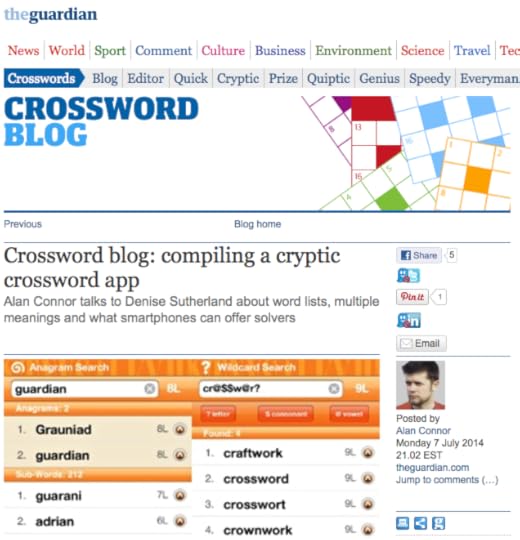
I'm very excited to announce my interview with Alan Connor, from The Guardian's Crossword blog. You may recall that I indexed Alan's book, Two Girls, One on Each Knee, last year.
Alan raised the idea of interviewing me about my CrypticGuide app when I was writing his index — and it has finally come to fruition.
CrypticGuide is an app that my husband and I developed over a year — it is a 'slender' cryptic dictionary, with around 7,000 cryptic definitions, abbreviations, indicator words, and homophones. It also includes an anagram solver and wildcard search.
It is very much a work in progress, with new cryptic definitions being added to the app over time. If you come across any cryptic terms in your puzzle solving, which aren't in the app, please let me know, so we can include them in future releases!
CrypticGuide is available on the App Store. It works on iPhones, iPods, and iPads. Unfortunately, at the moment it is only available for iOS, as an Android version involves rewriting the entire app, from massive database up ... possibly a task for later on, once my pet code monkey husband has retired from his day job?
Published on July 08, 2014 19:30



